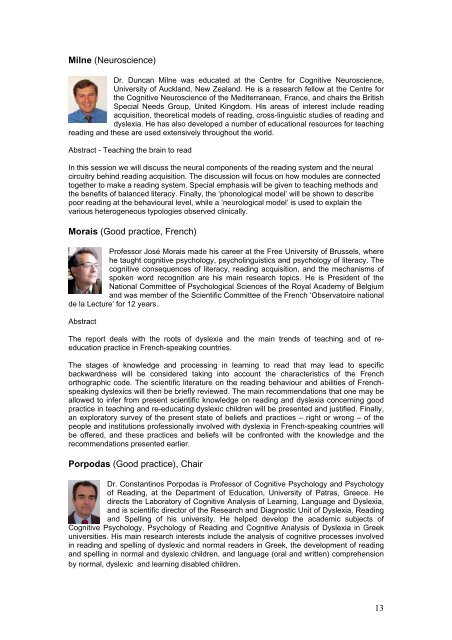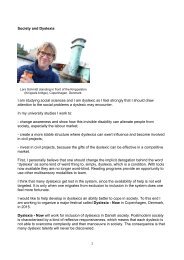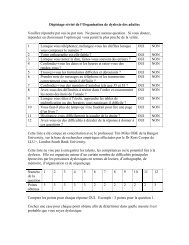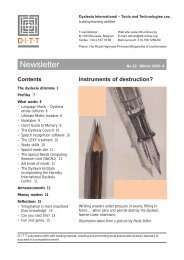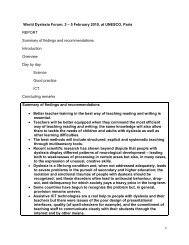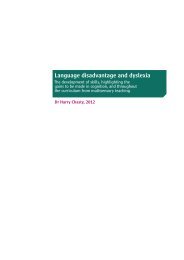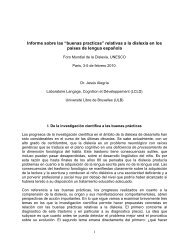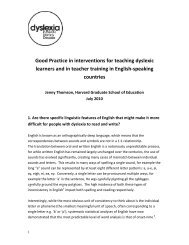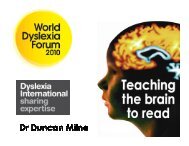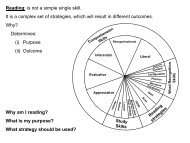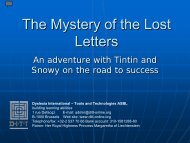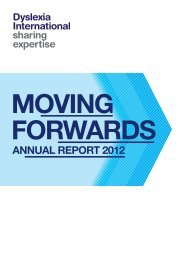Best practice in the teaching of reading and writing - Dyslexia ...
Best practice in the teaching of reading and writing - Dyslexia ...
Best practice in the teaching of reading and writing - Dyslexia ...
You also want an ePaper? Increase the reach of your titles
YUMPU automatically turns print PDFs into web optimized ePapers that Google loves.
Milne (Neuroscience)<br />
Dr. Duncan Milne was educated at <strong>the</strong> Centre for Cognitive Neuroscience,<br />
University <strong>of</strong> Auckl<strong>and</strong>, New Zeal<strong>and</strong>. He is a research fellow at <strong>the</strong> Centre for<br />
<strong>the</strong> Cognitive Neuroscience <strong>of</strong> <strong>the</strong> Mediterranean, France, <strong>and</strong> chairs <strong>the</strong> British<br />
Special Needs Group, United K<strong>in</strong>gdom. His areas <strong>of</strong> <strong>in</strong>terest <strong>in</strong>clude read<strong>in</strong>g<br />
acquisition, <strong>the</strong>oretical models <strong>of</strong> read<strong>in</strong>g, cross-l<strong>in</strong>guistic studies <strong>of</strong> read<strong>in</strong>g <strong>and</strong><br />
dyslexia. He has also developed a number <strong>of</strong> educational resources for teach<strong>in</strong>g<br />
read<strong>in</strong>g <strong>and</strong> <strong>the</strong>se are used extensively throughout <strong>the</strong> world.<br />
Abstract - Teach<strong>in</strong>g <strong>the</strong> bra<strong>in</strong> to read<br />
In this session we will discuss <strong>the</strong> neural components <strong>of</strong> <strong>the</strong> read<strong>in</strong>g system <strong>and</strong> <strong>the</strong> neural<br />
circuitry beh<strong>in</strong>d read<strong>in</strong>g acquisition. The discussion will focus on how modules are connected<br />
toge<strong>the</strong>r to make a read<strong>in</strong>g system. Special emphasis will be given to teach<strong>in</strong>g methods <strong>and</strong><br />
<strong>the</strong> benefits <strong>of</strong> balanced literacy. F<strong>in</strong>ally, <strong>the</strong> ‘phonological model’ will be shown to describe<br />
poor read<strong>in</strong>g at <strong>the</strong> behavioural level, while a ‘neurological model’ is used to expla<strong>in</strong> <strong>the</strong><br />
various heterogeneous typologies observed cl<strong>in</strong>ically.<br />
Morais (Good <strong>practice</strong>, French)<br />
Pr<strong>of</strong>essor José Morais made his career at <strong>the</strong> Free University <strong>of</strong> Brussels, where<br />
he taught cognitive psychology, psychol<strong>in</strong>guistics <strong>and</strong> psychology <strong>of</strong> literacy. The<br />
cognitive consequences <strong>of</strong> literacy, read<strong>in</strong>g acquisition, <strong>and</strong> <strong>the</strong> mechanisms <strong>of</strong><br />
spoken word recognition are his ma<strong>in</strong> research topics. He is President <strong>of</strong> <strong>the</strong><br />
National Committee <strong>of</strong> Psychological Sciences <strong>of</strong> <strong>the</strong> Royal Academy <strong>of</strong> Belgium<br />
<strong>and</strong> was member <strong>of</strong> <strong>the</strong> Scientific Committee <strong>of</strong> <strong>the</strong> French ‘Observatoire national<br />
de la Lecture’ for 12 years.<br />
Abstract<br />
The report deals with <strong>the</strong> roots <strong>of</strong> dyslexia <strong>and</strong> <strong>the</strong> ma<strong>in</strong> trends <strong>of</strong> teach<strong>in</strong>g <strong>and</strong> <strong>of</strong> reeducation<br />
<strong>practice</strong> <strong>in</strong> French-speak<strong>in</strong>g countries.<br />
The stages <strong>of</strong> knowledge <strong>and</strong> process<strong>in</strong>g <strong>in</strong> learn<strong>in</strong>g to read that may lead to specific<br />
backwardness will be considered tak<strong>in</strong>g <strong>in</strong>to account <strong>the</strong> characteristics <strong>of</strong> <strong>the</strong> French<br />
orthographic code. The scientific literature on <strong>the</strong> read<strong>in</strong>g behaviour <strong>and</strong> abilities <strong>of</strong> Frenchspeak<strong>in</strong>g<br />
dyslexics will <strong>the</strong>n be briefly reviewed. The ma<strong>in</strong> recommendations that one may be<br />
allowed to <strong>in</strong>fer from present scientific knowledge on read<strong>in</strong>g <strong>and</strong> dyslexia concern<strong>in</strong>g good<br />
<strong>practice</strong> <strong>in</strong> teach<strong>in</strong>g <strong>and</strong> re-educat<strong>in</strong>g dyslexic children will be presented <strong>and</strong> justified. F<strong>in</strong>ally,<br />
an exploratory survey <strong>of</strong> <strong>the</strong> present state <strong>of</strong> beliefs <strong>and</strong> <strong>practice</strong>s – right or wrong – <strong>of</strong> <strong>the</strong><br />
people <strong>and</strong> <strong>in</strong>stitutions pr<strong>of</strong>essionally <strong>in</strong>volved with dyslexia <strong>in</strong> French-speak<strong>in</strong>g countries will<br />
be <strong>of</strong>fered, <strong>and</strong> <strong>the</strong>se <strong>practice</strong>s <strong>and</strong> beliefs will be confronted with <strong>the</strong> knowledge <strong>and</strong> <strong>the</strong><br />
recommendations presented earlier.<br />
Porpodas (Good <strong>practice</strong>), Chair<br />
Dr. Constant<strong>in</strong>os Porpodas is Pr<strong>of</strong>essor <strong>of</strong> Cognitive Psychology <strong>and</strong> Psychology<br />
<strong>of</strong> Read<strong>in</strong>g, at <strong>the</strong> Department <strong>of</strong> Education, University <strong>of</strong> Patras, Greece. He<br />
directs <strong>the</strong> Laboratory <strong>of</strong> Cognitive Analysis <strong>of</strong> Learn<strong>in</strong>g, Language <strong>and</strong> <strong>Dyslexia</strong>,<br />
<strong>and</strong> is scientific director <strong>of</strong> <strong>the</strong> Research <strong>and</strong> Diagnostic Unit <strong>of</strong> <strong>Dyslexia</strong>, Read<strong>in</strong>g<br />
<strong>and</strong> Spell<strong>in</strong>g <strong>of</strong> his university. He helped develop <strong>the</strong> academic subjects <strong>of</strong><br />
Cognitive Psychology, Psychology <strong>of</strong> Read<strong>in</strong>g <strong>and</strong> Cognitive Analysis <strong>of</strong> <strong>Dyslexia</strong> <strong>in</strong> Greek<br />
universities. His ma<strong>in</strong> research <strong>in</strong>terests <strong>in</strong>clude <strong>the</strong> analysis <strong>of</strong> cognitive processes <strong>in</strong>volved<br />
<strong>in</strong> read<strong>in</strong>g <strong>and</strong> spell<strong>in</strong>g <strong>of</strong> dyslexic <strong>and</strong> normal readers <strong>in</strong> Greek, <strong>the</strong> development <strong>of</strong> read<strong>in</strong>g<br />
<strong>and</strong> spell<strong>in</strong>g <strong>in</strong> normal <strong>and</strong> dyslexic children, <strong>and</strong> language (oral <strong>and</strong> written) comprehension<br />
by normal, dyslexic <strong>and</strong> learn<strong>in</strong>g disabled children.<br />
13


